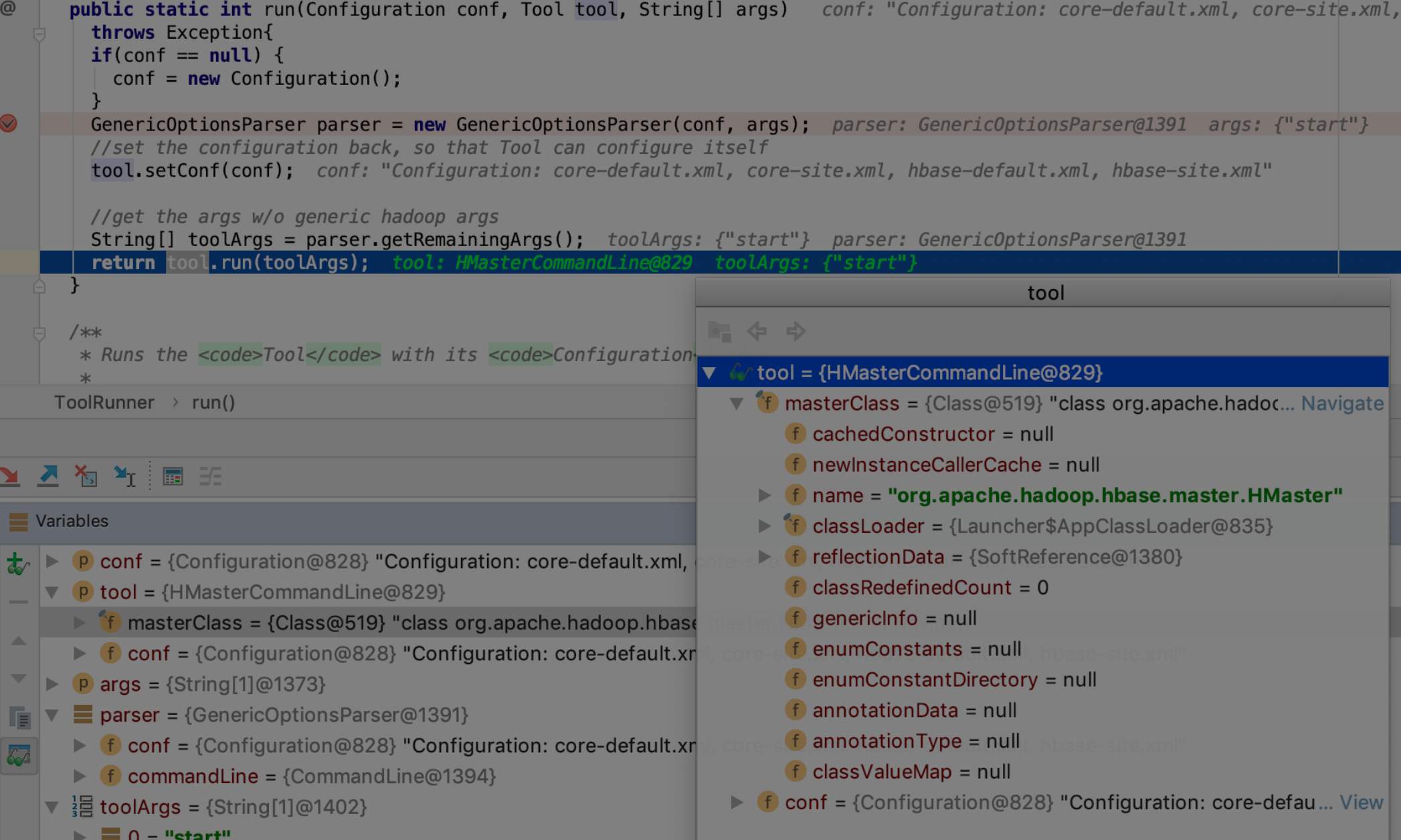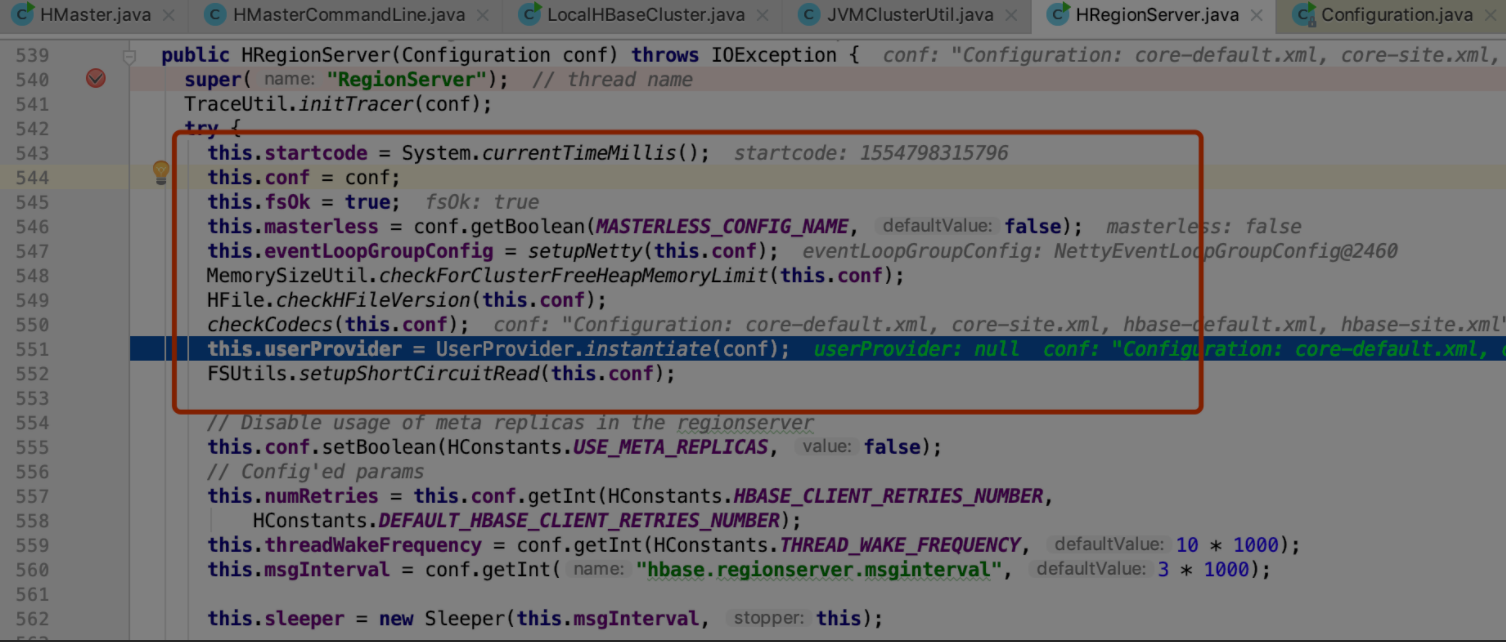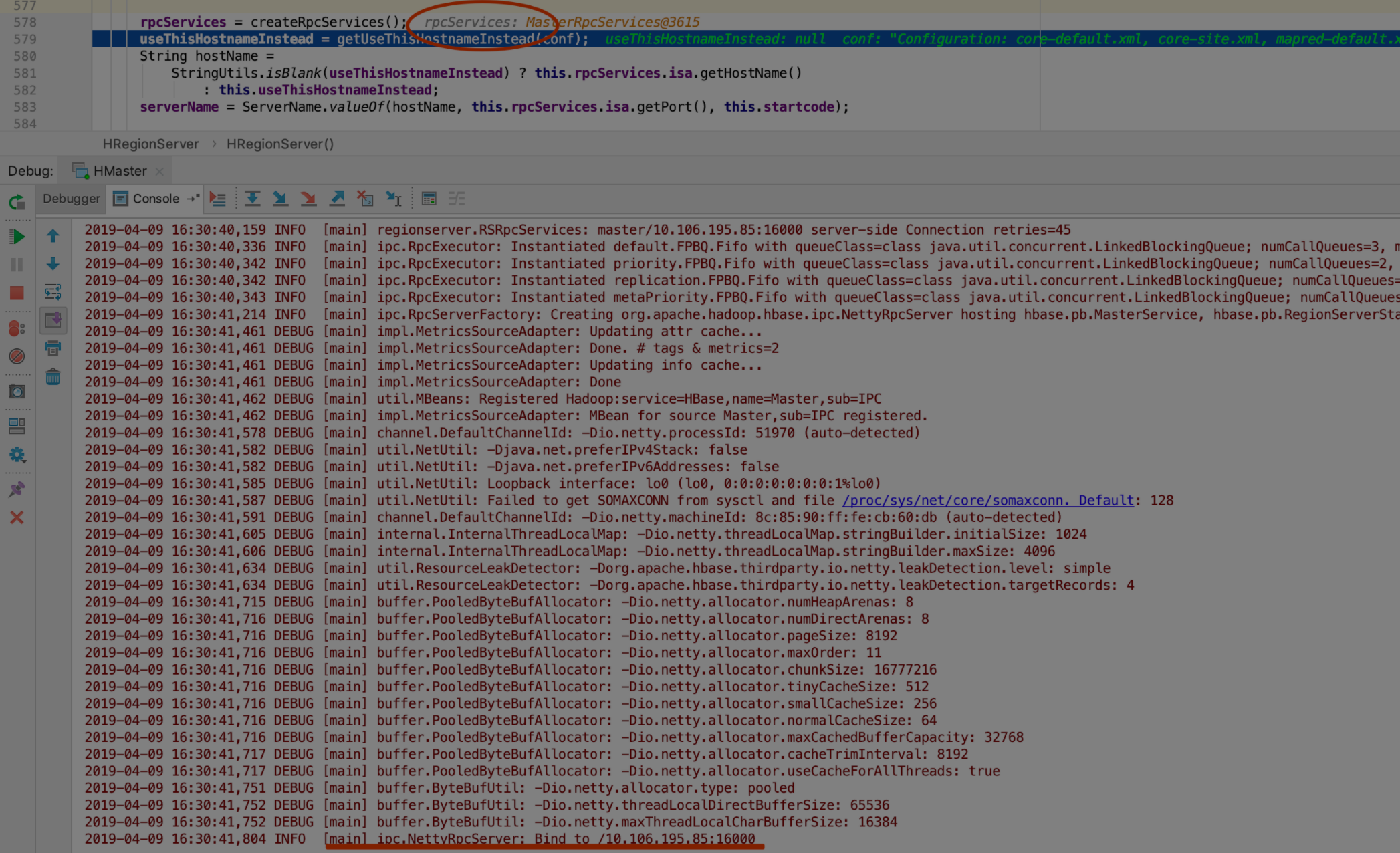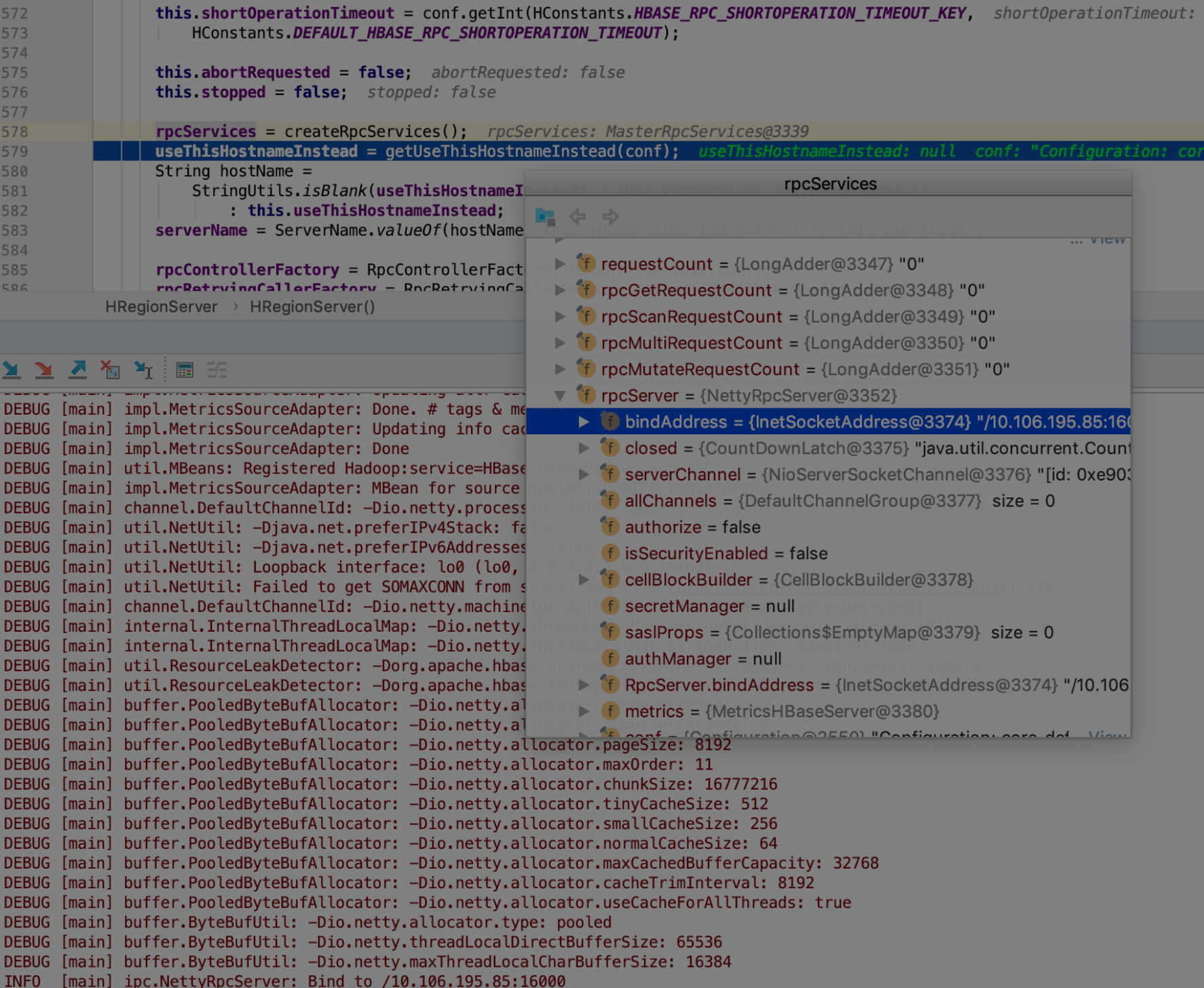HBase--HMaster的启动流程
本篇文章主要来看一看HMaster的启动流程,直接进入主题吧。
ps:这些文章都是从我先记录到我为知笔记然后有空了就写成博客的,mac的为知笔记图片保存不是很方便,这篇文章的图片通过截图过来的上传后发现有点模糊,只能将就看了。
HMaster加载配置
org.apache.hadoop.hbase.master.HMaster调用类中的main方法- 在main方法中主要做了
- 打印启动日志,
- 调用HMasterCommandLine对象doMain()方法
a). 日志打打印
b). 调用HMasterCommandLine对象doMain()方法
HMasterCommandLine extends ServerCommandLine而HMasterCommandLine没有重写doMain()方法,即调用了o.a.h.h.u.ServerCommandLine接口中的doMain()方法
doMain()方法,采用了Hadoop的ToolRunner机制
c). 先来看看,org.apache.hadoop.hbase.HBaseConfiguration的create()方法,从字面意思就知道是在创建配置文件
d). 加载:core-default.xml,core-site.xml,hbase-default.xml,hbase-sute.xml
加载配置看完了之后,回退回来继续看
ToolRunner.run(HBaseConfiguration.create(), this, args);
即:
org.apache.hadoop.util.ToolRunner.run,如下:
将conf和args封装成GenericOptionsParser对象parser, 根据parser获取toolArgs
返回tool.run(toolArgs);
tool.run(toolArgs)也即HMasterComandLine.run(toolArgs)
org.apache.hadoop.hbase.master.HMasterComandLine.run(toolArgs),重点在下面的startMaster()私有方法

重点来看看:
org.apache.hadoop.hbase.master.HMasterCommandLine.startMaster()
由于代码过长我就不截图了
从注释就知道会有两种模式:本地模式和分布式模式。
1)本地模式local,master,regionserver,ZK都在同一个JVM中;
2)分布式模式distributed,仅只会启动一个HMaster对象。
代码里面大部分就是做一些配置处理,zk地址端口等,重点关注
- local本地模式:ZK启动MiniZooKeeperCluster.startup(zkDataPath);
- local本地模式:hmser,regionserver启动LocalHBaseCluster.startup();
- distributed分布式模式:HMaster启动,HMaster.start()。
1
2
3
4
5
6
7
8
9
10
11
12
13
14
15
16
17
18
19
20
21
22
23
24
25
26
27
28
29
30
31
32
33
34
35
36
37
38
39
40
41
42
43
44
45
46
47
48
49
50
51
52
53
54
55
56
57
58
59
60
61
62
63
64
65
66
67
68
69
70
71
72
73
74
75
76
77
78
79
80
81
82
83
84
85
86
87
88
89
90
91
92
93
94
95
96
97
98
99
100
101private int startMaster() {
Configuration conf = getConf();
TraceUtil.initTracer(conf);
try {
// If 'local', defer to LocalHBaseCluster instance. Starts master
// and regionserver both in the one JVM.
if (LocalHBaseCluster.isLocal(conf)) {
DefaultMetricsSystem.setMiniClusterMode(true);
final MiniZooKeeperCluster zooKeeperCluster = new MiniZooKeeperCluster(conf);
File zkDataPath = new File(conf.get(HConstants.ZOOKEEPER_DATA_DIR));
// find out the default client port
int zkClientPort = 0;
// If the zookeeper client port is specified in server quorum, use it.
String zkserver = conf.get(HConstants.ZOOKEEPER_QUORUM);
if (zkserver != null) {
String[] zkservers = zkserver.split(",");
if (zkservers.length > 1) {
// In local mode deployment, we have the master + a region server and zookeeper server
// started in the same process. Therefore, we only support one zookeeper server.
String errorMsg = "Could not start ZK with " + zkservers.length +
" ZK servers in local mode deployment. Aborting as clients (e.g. shell) will not "
+ "be able to find this ZK quorum.";
System.err.println(errorMsg);
throw new IOException(errorMsg);
}
String[] parts = zkservers[0].split(":");
if (parts.length == 2) {
// the second part is the client port
zkClientPort = Integer.parseInt(parts [1]);
}
}
// If the client port could not be find in server quorum conf, try another conf
if (zkClientPort == 0) {
zkClientPort = conf.getInt(HConstants.ZOOKEEPER_CLIENT_PORT, 0);
// The client port has to be set by now; if not, throw exception.
if (zkClientPort == 0) {
throw new IOException("No config value for " + HConstants.ZOOKEEPER_CLIENT_PORT);
}
}
zooKeeperCluster.setDefaultClientPort(zkClientPort);
// set the ZK tick time if specified
int zkTickTime = conf.getInt(HConstants.ZOOKEEPER_TICK_TIME, 0);
if (zkTickTime > 0) {
zooKeeperCluster.setTickTime(zkTickTime);
}
// login the zookeeper server principal (if using security)
ZKUtil.loginServer(conf, HConstants.ZK_SERVER_KEYTAB_FILE,
HConstants.ZK_SERVER_KERBEROS_PRINCIPAL, null);
int localZKClusterSessionTimeout =
conf.getInt(HConstants.ZK_SESSION_TIMEOUT + ".localHBaseCluster", 10*1000);
conf.setInt(HConstants.ZK_SESSION_TIMEOUT, localZKClusterSessionTimeout);
LOG.info("Starting a zookeeper cluster");
int clientPort = zooKeeperCluster.startup(zkDataPath);
if (clientPort != zkClientPort) {
String errorMsg = "Could not start ZK at requested port of " +
zkClientPort + ". ZK was started at port: " + clientPort +
". Aborting as clients (e.g. shell) will not be able to find " +
"this ZK quorum.";
System.err.println(errorMsg);
throw new IOException(errorMsg);
}
conf.set(HConstants.ZOOKEEPER_CLIENT_PORT, Integer.toString(clientPort));
// Need to have the zk cluster shutdown when master is shutdown.
// Run a subclass that does the zk cluster shutdown on its way out.
int mastersCount = conf.getInt("hbase.masters", 1);
int regionServersCount = conf.getInt("hbase.regionservers", 1);
// Set start timeout to 5 minutes for cmd line start operations
conf.setIfUnset("hbase.master.start.timeout.localHBaseCluster", "300000");
LOG.info("Starting up instance of localHBaseCluster; master=" + mastersCount +
", regionserversCount=" + regionServersCount);
LocalHBaseCluster cluster = new LocalHBaseCluster(conf, mastersCount, regionServersCount,
LocalHMaster.class, HRegionServer.class);
((LocalHMaster)cluster.getMaster(0)).setZKCluster(zooKeeperCluster);
cluster.startup();
waitOnMasterThreads(cluster);
} else {
logProcessInfo(getConf());
HMaster master = HMaster.constructMaster(masterClass, conf);
if (master.isStopped()) {
LOG.info("Won't bring the Master up as a shutdown is requested");
return 1;
}
master.start();
master.join();
if(master.isAborted())
throw new RuntimeException("HMaster Aborted");
}
} catch (Throwable t) {
LOG.error("Master exiting", t);
return 1;
}
return 0;
}
ZK启动
ZK启动MiniZooKeeperCluster.startup(zkDataPath);
zk的启动,主要逻辑在org.apache.zookeeper.server.NIOServerCnxnFactory
local HBase的启动(Master,RegionServer)以线程的方式
初始化一个LocalHBaseCluster,
org.apache.hadoop.hbase.LocalHBaseCluster
org.apache.hadoop.hbase.LocalHBaseCluster 实例化,可以看到下面调用了addMaster()、addRegionServer()
创建master线程
addMaster(),调用
JVMClusterUtil.createMasterThread创建master线程
创建master线程

hmc 即 org.apache.hadoop.hbase.master.HMasterCommandLine$LocalHMaster 对象
LocalHMaster extends HMaster
Master extends HRegionServer implements MasterServices
构造函数主要做了几件事情:1.初始化相关配置 2.初始化rpcServer 3.初始化zk监控类,下面看看一些具体的细节
1)在HRegionServer中会做初始化配置,检查
2)在HRegionServer中创建MasterRpcService

3)在HRegionServer中创建initializeFileSystem();
4)在HRegionServer中初始化zk监控类,启动相关服务
启动regionServer类似

